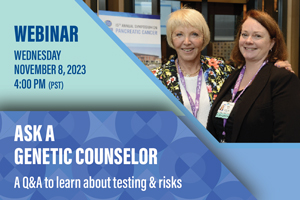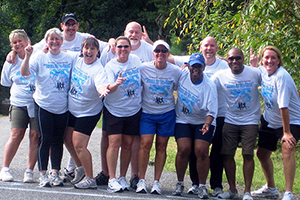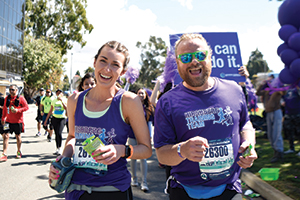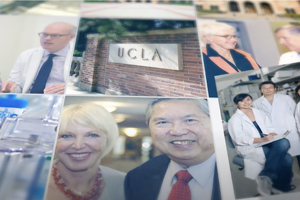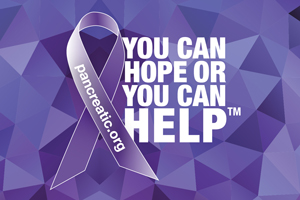In early October, we hosted a gathering of scientists and researchers working on pancreatic cancer at UCLA, highlighting some of our recent Seed Grant awardees. With the goal to share innovative work happening across disciplines, connect researchers, and foster collaboration, it was an inspiring afternoon.
We’re excited to share some updates from past Seed Grant researchers that came from this gathering. We look forward to sharing more from these great minds as the afternoon sparked connections and potential future collaborations.
In 2019, Thuc Le, PhD, was awarded a Seed Grant for his project Mapping and Targeting Nucleotide Biosynthetic Plasticity in Mutant KRAS Driven Pancreatic Cancer. This research focuses on tackling mutant KRAS in pancreatic cancer and understanding its effects on cell signals and metabolism to influence the immune response. One important discovery that has been made to date is that blocking KRAS leads to higher levels of adenosine released by tumor cells, which can make the immune system less effective. Combining therapies that target both KRAS and adenosine shows promise in achieving stronger anti-cancer effects in this difficult-to-treat cancer.
Some pancreatic adenocarcinoma (PDAC) patients survive exceptionally long despite metastatic disease; these patients are able to generate effective, systemic immune responses against their tumors. Jason Link, PhD, a 2022 awardee, looked at the anti-tumor immune response that takes place in tertiary lymph structures to understand if these structures can be therapeutically ignited as a treatment avenue. Patients with poor outcomes fail to generate these immune responses due to ineffective signals between the tumor and immune cells, but these signals are therapeutically targetable.
KRAS mutations are the most common drivers of pancreatic ductal adenocarcinoma (PDAC). Recent clinical translation of mutant KRAS-specific inhibitors has reinvigorated hope for direct targeting; however, research has shown they need to be administered as combination therapies. Research from Evan Abt, PhD, a 2022 Seed Grant Awardee, uncovered new mechanisms that restrain anti-tumor immunity in pancreatic cancer. The suppression of the immune response is partly due to unexpected crosstalk between metabolic and immune networks. These insights provide a rationale for new therapeutic interventions to unleash immune responses targeting pancreatic cancer.
2022 Seed Grant researcher, Alexandra Demcsak, MD, PhD, looked into hereditary pancreatitis, an early-onset form of chronic pancreatitis caused by mutations in the digestive proteases (enzymes that break down proteins). Her research investigated the effects of carboxypeptidase A1 (CPA1) gene mutations on pancreatic ductal adenocarcinoma development. Based on the results, the p.N256K mutation of the CPA1 gene accelerates the development of precancerous lesions in the pancreas of KrasG12D x p48-Cre models. These findings provide support for the concept that misfolding CPA1 mutants are risk factors for pancreatic ductal adenocarcinoma, deepening our understanding of how chronic inflammation promotes tumor growth in the pancreas.
An innovative 2021 Seed Grant project by Keisuke Iwamoto, PhD used weak magnetic fields to enhance treatment sensitivity of pancreatic cancer cells.
The projects presented at the UCLA gathering helped spark inspiration, collaboration, and connection across disciplines. We look forward to sharing future progress reports from these researchers as they continue their important work. It is because of your support that we can fund these crucial projects and help move science towards better diagnostic and treatment options, and ultimately, a cure.
